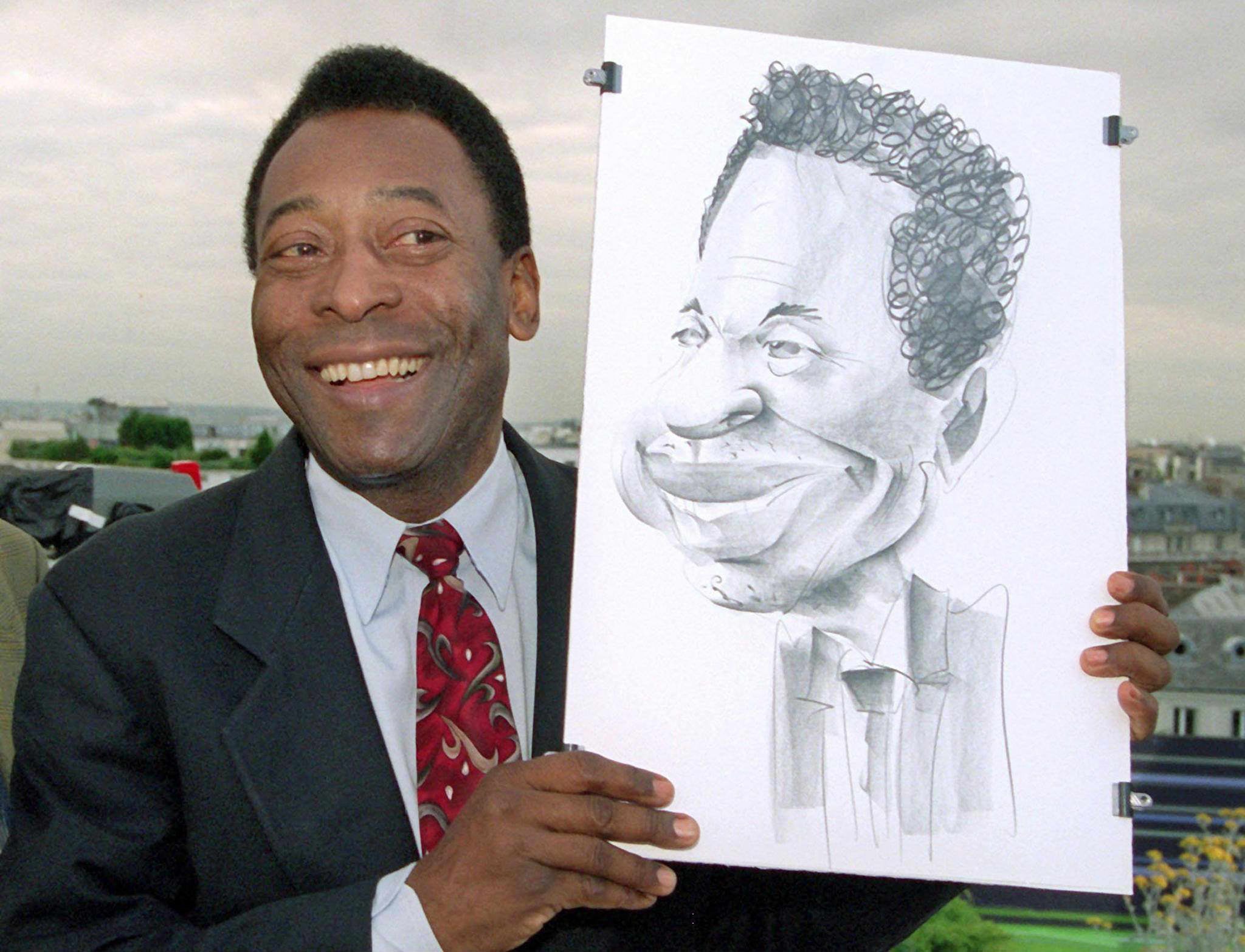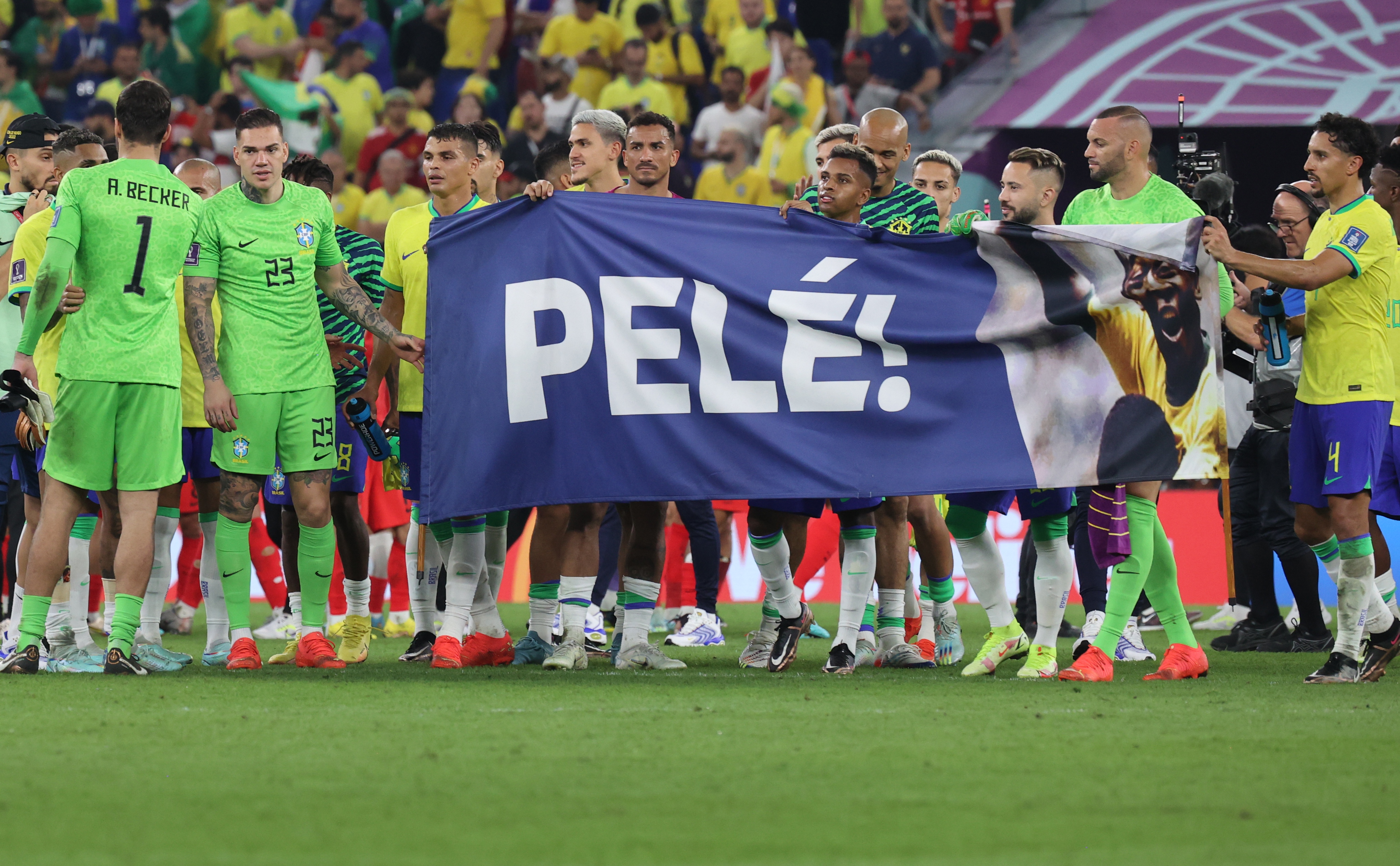Death has dethroned the soccer kingdom of its king. One of the greatest players to ever kick a soccer ball, Edson Arantes do Nascimento (better known by his nickname Pelé) lost the final match in his life – this time to cancer.
Pelé succumbed to a long battle with colon cancer on Thursday, 29 November.
The 82-year-old had a tumor removed from his colon in September 2021 and had been in and out of the hospital for treatment on a regular basis prior to his passing.
The Brazilian football legend’s condition worsened in the last fortnight. The 82-year-old spent Christmas in hospital with his family, as he received treatment for his cancer.
Pioneer
In recent weeks there has been a viral video circulating on various social media platforms. The clip shows various generations of football greatness performing some of their best skills, which are then contrasted with snippets of soccer icon Pelé performing similar or the same exact moves.
Pelé vinha do futuro, o MAIOR, MELHOR e não tem jeito.
Que vídeo foda. pic.twitter.com/C5oOI0TBIS
— memes futebolisticos. – vito (@Mfutebolisticos) November 20, 2021
From Zinedine Zidane’s famous pirouettes, to Cristiano Ronaldo’s chop, as well as Andrés Iniesta’s mesmerising midfield runs – the narrator in the video says: “Pelé did it first.”
Now the assertion that the late 82-year-old was the inventor of the many moves we have seen on the pitch over the decades is not something that can be proven beyond reasonable doubt. There were probably others who did the same moves before the Brazilian.
Nevertheless, one thing is indisputable – though others may have performed the same moves before he did, Pelé pulled some of them off as a 16-year-old while playing for one of Brazil’s most recognised clubs – Santos.
He also performed such moves as a 17-year-old, as he took the world by storm and led Brazil to their first ever Fifa World Cup in 1958.
These displays set him up to be one of the most influential athletes at the time. It also set him up to be regarded as one the greatest humans to kick a soccer ball, and indeed placed him amongst the most legendary athletes of all time.
After all, at this moment, no soccer player can claim to have three World Cup gold medals. Nor does anyone, other than Pelé, possess the bragging rights of being the youngest player to win gold at the elite global football spectacle – which Pelé did as a 17-year-old in Sweden.
The Brazilian forward’s hatrick in the semifinal of the same competition – versus France – saw him become the youngest player ever to score a treble in World Cup history. A record that still stands to this day.
In the final, versus the host nation of the 1958 showpiece, Pelé became the youngest player to play and score in a World Cup final. Both records remain intact to this day.
Safe to say, with such accolades and many others, the man born Edson Arantes do Nascimento on 23 October 1940, in Minas Gerais, is firmly etched in sports history.
It is why in 1999, he was named Athlete of the Century by the International Olympic Committee. In the same year the Brazilian, who inspired compatriots such as Luis Ronaldo, Rivaldo and Ronaldinho, was included in Time magazine’s list of the 100 most important people of the 20th century.
A year later he was honoured as one of two joint players of the century by world soccer governing body, Fifa. This award he received alongside late Argentinian legend Diego Maradona.
At the turn of the millennium Pelé also scooped the accolade of World Player of the Century, courtesy of the International Federation of Football History and Statistics.
His haul of 1,279 goals in 1,363 games, which includes friendlies, is recognised as a Guinness World Record for soccer. Though there have been some disputes over the tally. After all, the technology present these days to track such records was not available during the Brazilian’s prime.
Nevertheless, one thing is incontestable, Pelé is one the greatest goal scorers of all-time. He was also an inspiration to many modern-day soccer icons, including the likes of Cristiano Ronaldo and Lionel Messi – whether directly or indirectly.

Visit Daily Maverick’s home page for more news, analysis and investigations
A genius giant
Messi and Ronaldo may be the faces of soccer for the new school – owing to their logic-defying feats. However, it was Pelé who was soccer’s first true global superstar.
Former England captain and defender Bobby Moore once said of the Brazilian icon: “Pelé was the most complete player I’d ever seen, he had everything. Two good feet. Magic in the air. Quick. Powerful. He could beat people with skill, and could outrun people.
“He was only 1,73m, yet he seemed a giant of an athlete on the pitch. Perfect balance and impossible vision. He was the greatest because he could do anything and everything on a football pitch.”
Indeed, Pelé revolutionised the game of soccer, on and off the field.
After being rejected by a number of soccer clubs as a teenager in Sao Paulo, the forward eventually joined Santos in 1956, aged 15. There he would ascend to the upper echelons of global soccer as he led the club to nine league titles, the continental Copa Libertadores, as well as the International Club Cup.
A year after joining Santos, he made his debut for the national team as a 16-year-old. He would proceed to win three World Cups with Brazil, being integral 1958 and 1970, while playing only a cameo role in 1962 (owing to injury).
The Brazilian phenomenon retired from international soccer the year after winning his third Jules Rimet trophy, having netted an astonishing 77 goals from just 92 games – including 12 goals in 14 games across his three World Cup appearances.
Despite the fact that he ended his club career at New York Cosmos in the USA, the star forward had been the subject of sustained interest from some of European football’s powerhouses after his heroics during his first World Cup.
Following those displays at the 1958 showpiece, Pelé was declared a national treasure by the Brazilian government in order to ensure that he remained in his native country.
Thereafter Santos made sure they capitalised on the teenager’s star power as they toured globally – with Pelé the main attraction.
“I remember counting that I had played 109 times for Santos alone in 1960. There was no break in the year’s football,” the formerly fleet-footed forward recalled in Andreas Campomar’s book Golazo.

American dream
Pelé announced his official retirement from soccer in 1974. However, he decided to continue playing and joined the North American Soccer League’s New York Cosmos before retiring in 1977.
Though the likes of David Beckham, Thierry Henry and Steven Gerrard have recently made their way to America, it was Pelé who paved the way for them, plus players such as German legend Franz Beckenbauer.
As that viral video says: Pelé did it first. Now the man considered the ‘King of Soccer’ by many who had the privilege of seeing him play the beautiful game in his prime is physically no more. However, his futuristic feats are indelibly etched in soccer history. DM
Pelé in quotes:
“When Pelé talks, the world listens. It’s impossible not to get emotional when such an amazing person shows all his respect and admiration towards me. An eternal hero, a myth for all generations and a true legend of sports.” – Cristiano Ronaldo, Portuguese legend.
“His great secret was improvisation. Those things he did were in one moment. He had an extraordinary perception of the game.” – Carlos Alberto Torres, former teammate of Pelé.
“I told myself before the game, ‘he’s made of skin and bones just like everyone else’. But I was wrong.” – Tarcisio Burgnich, the Italy defender who marked Pelé in the Mexico World Cup 1970 final.
“I arrived hoping to stop a great man, but I went away convinced I had been undone by someone who was not born on the same planet as the rest of us.” – Costa Pereira on Benfica’s 5-2 loss to Santos in the 1962 Intercontinental Cup in Lisbon.
“When I saw Pelé play, it made me feel I should hang up my boots.” – Ferenc Puskas, Real Madrid and Hungary legend.
“Absolutely everybody wanted to shake his hand, to get a photo with him. Saying you had partied with Pelé was the biggest badge of honour going.” – Mick Jagger, English singer.
“Everyone said he was finished. When we were world champions he walked into the dressing room and – this still gives me butterflies today – screamed three times: ‘I didn’t die. I didn’t die. I didn’t die.’ He’s without doubt the greatest player in history.” – Roberto Rivellino, 1970 World Cup winner with Brazil.
.